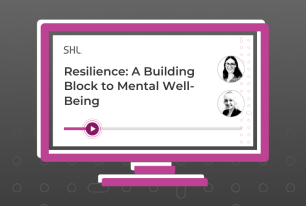The Importance of Mental Health Programs in the Workplace
How companies can support their employee’s mental well-being on World Mental Health Day and all year round.
Share
We recently celebrated World Mental Health Day at SHL. The World Health Organization (WHO) recognizes this day to promote awareness for the global community in an empathetic way, with a unifying voice, helping people feel hopeful by empowering them to take action and create lasting change. It was an important day for us to ensure that our workplace provides everyone with a safe and healthy environment, including countless opportunities to thrive.
World Mental Health Day gave us a way to get the conversation started about mental health by talking, sharing stories and listening. Our goals were to promote better mental health awareness at work and to combat the social stigma that still exists around mental illness.

Across the globe, we hosted chair yoga sessions to show employees quick exercises they can do to help relieve stress and take a moment out of their day to be mindful. In addition, our EAP (Employee Assistance Program) provider, Workplace Options, ran a set of webinars on ‘Mental Health – Making a Difference Together’ which attracted lots of interest.
SHL’s headquarters in Thames Ditton, U.K., ran a ‘Tea & Talk’ session, encouraging employees to join us for an open conversation about mental health and providing them with some useful information and resources.
We understand that reaching and maintaining positive mental health cannot be done in one day, it’s a journey. With this in mind, we created additional internal resources to support ongoing mental health awareness at SHL. These resources include links to apps, games, videos, and documents that can help people make small changes at work or teach them some useful exercises to help reduce stress and practice good self-care.
Why is it important to mark World Mental Health Day in the workplace?
- One in six British workers are affected by mental health problems like anxiety, depression, and stress every year
- Around 15% of people at work have symptoms of an existing mental health condition
- 9 out of 10 people who experience mental health problems say they face stigma and discrimination and 54% percent of people say they are impacted most by this stigma in their place of work
- As a result, 300,000 people with long-term mental health problems leave their jobs each year
- Less than half of employees say they would feel able to talk openly with their line manager if they were suffering from stress and 95% of employees will cite an alternative reason to stress when calling in sick
Source: www.mind.org.uk
If you are interested in learning more and accessing resources on mental health, including mental health at work, please visit the WHO website.









